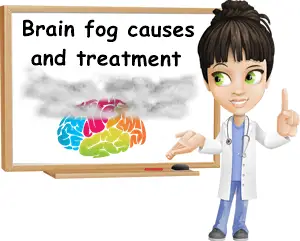Brain fog is the personal experience of a state of altered consciousness that causes clouded thinking. This engenders a wide variety of mild to more severe symptoms such as forgetfulness, tiredness, a general and visible lack of motivation, problems communicating thoughts and feelings, difficulty concentrating and resulting feelings of annoyance, anger, frustration and even sadness. Brain fog is known to cause reduced productivity and low quality of life. At times, it is reason for concern, indicating an underlying medical condition.
What does brain fog actually mean? The concept of brain fog denominates a medical condition that affects the sharpness of our cognitive functions. It impacts all mental functions, notably thinking and feeling. The condition has often been described as a sort of general mental confusion that causes one to experience a sense of indifference towards what is happening around them and thus be slow in responding and interacting. In my experience, what brain fog does is blur out everything, make it seem unimportant and hazy. I find even language is confusing and experience a continual tiredness that makes me linger in inactivity. With brain fog, there isn’t really any activity going on, but a sort of superficial interaction that only resembles purposeful action.

It’s important to understand that brain fog is somewhat different for everyone, hence the reason why not all solutions for dealing with brain fog work for everyone. For some people, indifference, lethargy and lack of motivation are at the center of their experience. For others, it’s about sheer forgetfulness and the inability to remain focused. There are also those that find tiredness as the most meaningful part of their experience, while others are bothered by a strange inability to understand language and work with it in order to communicate efficiently and relate to others and their surroundings. The point is different people have a different take on brain fog and since the condition is highly subjective and cannot be assessed by anyone but the person experiencing it, it remains a very personal experience.
List of potential causes
So what can cause brain fog and how does it occur?
1) Exhaustion. When you are tired, you aren’t yourself and can’t think clearly or be productive. Extreme tiredness or fatigue can cloud our thinking and lead to brain fog, especially when it’s ongoing.
2) Stress. When it’s short-lived or temporary and not very intense, stress can even be beneficial. But a continual state of stress can negatively affect our endocrine system and feed a vicious circle of hormones and neurotransmitters that encourage brain fog by reducing performance.
3) Sleep deprivation. Having insomnia, not enjoying restful sleep by waking off often during the night, not managing to stay asleep generates more stress in return and impacts the endocrine and nervous system in a way that both causes and further encourages brain fog.

4) Sedentarism and routine. Our brain needs diversity to stay inspired, creative and productive. Routine reduces creativity and cognitive performance and an under-worked brain is subjected to idleness. Sedentarism takes away our brain’s chances to see something new and get inspired and encourages routine, together contributing to brain fog.
5) Dehydration. It’s not uncommon for dehydration to dull our thinking and give us brain fog. When you are dehydrated, your brain and nervous system suffer. The more dehydration progresses, the foggier our thinking becomes and the more confused we get, hence the mental fog. If not addressed in time, it can even lead to delirium and total loss of consciousness in the form of fainting.
6) Underactive thyroid. Everyone knows an underactive thyroid (hypothyroidism) causes forgetfulness, but if it’s left untreated, it can lead to episodes of brain fog that can greatly affect one’s quality of life. At its worst, an underactive thyroid can mess up metabolism and lead to infertility.
7) Anxiety and depression. Both anxiety disorder and depression make us lose motivation and interest in everything, keep us away from the outdoors and in a rut, generate feelings of sadness, anger, frustration, cause fatigue and low productivity, all of which contribute to brain fog.
8) Migraines. When something hurts, anything, you can’t think clearly, can’t pay attention to what others are telling you, don’t find the motivation to work and are simply unproductive and distracted. Migraines are one example of how pain impairs thinking and causes mental fog.
9) Hormonal imbalances. In addition to hypothyroidism, other hormonal imbalances such as fluctuating estrogen levels in women can cause brain haze, forgetfulness and clouded thinking. Pregnancy is a good example of how hormones lead to mental fog.
10) Other medical conditions. It has been suggested that brain fog can be caused, encouraged or worsened by conditions such as: chronic fatigue, fibromyalgia, hypoglycemia, diabetes, disorders of the nervous and endocrine systems (hormones and neurotransmitters direct brain activity), conditions affecting the digestive system such as malabsorption problems or irritable bowel syndrome (it’s in the stomach that vitamins and minerals are absorbed, but if this function is compromised by various disorders, then brain and nervous system activity are impaired too), dementia etc.
11) Magnesium deficiency. Magnesium helps the brain communicate information to muscles and receive it in return. But if we aren’t getting or absorbing enough magnesium, then our brain won’t be functioning optimally, hence the mental fog and symptoms of anger, sadness, difficulty focusing, remembering information and low productivity.
12) B vitamins deficiency. B vitamins are crucial for brain health (they actually contribute to its development). When we aren’t getting enough or our requirements increase, our thinking is not as sharp and cognitive performance decreases. At one point, we start experiencing symptoms of brain fog. Stress, for example, ups our B vitamins requirements by a lot and is a cause of brain fog too.
13) A diet low in fats. Our brain consumes fats, among other types of nutrients and when we don’t give it fuel to sustain its activity, it performs poorly. It’s the same thing that happens to the rest of the body when we don’t eat and become hypoglycemic: we get weaker, find it increasingly more difficult to do anything and slowly shut down. Similarly, a too low a intake of fats can impair cognition significantly, resulting in mental fog.
14) Medicine side effects. It has been suggested that brain fog can be a side effect of a variety of medication from chemotherapy medication to antacids, proton-pump inhibitors for gastritis and acid reflux, cholesterol, allergy, attention deficit disorder or insomnia medication. Many of these work by blocking certain neurotransmitters in the brain, hence the fogginess in thinking, confusion and forgetfulness. Anesthetics can also cause brain fog and there have been many reports of people experiencing brain fog after dental procedures such as root canal treatment.
To consider
The condition in itself is reason for concern when it indicates a more serious underlying cause, which is why it is important to have a doctor investigate the causes of your brain fog as soon as possible. If it’s a result of harmless circumstances such as stress or not getting enough sleep, working on these problematic aspects of your lifestyle is enough to improve brain fog. If there is an underlying cause, plenty of treatment options are available and your doctor will be sure to guide you through the process.
Signs and symptoms
What does brain fog feel like? Here are 14 signs and symptoms that tell you what it’s like when you have brain fog:
1) Forgetfulness, difficulty remembering things.
2) Low energy levels, idleness and tiredness, continual and disabling.
3) Confusion, a feeling of being foggy-headed or disconnected.
4) Thinking seems fuzzy, hazy, clouded, blurred or odd.
5) Difficulty concentrating, trouble staying focused and attentive.
6) Difficulty communicating: lose the train of thought, cannot pay attention to the conversation, are late in formulating a response, are uninterested.
7) Trouble understanding language and finding it difficult to put thoughts into words, communicate ideas and feelings.
8) You get distracted very easily and lose track of your thoughts and ideas, daydream.
9) Everything seems difficult, you spend an unusual amount of time trying to accomplish fairly simple tasks.
10) You are indifferent, lack motivation to do anything.
11) You lie in idleness, inactivity and are slow or unproductive.
12) You may feel sad, hopeless, anxious or depressed as a result.
13) Insomnia and headaches may occur.
14) Irritability, annoyance, frustration can ensue.
Other important characteristics of brain fog. Brain fog can begin suddenly one day and go away in a matter of hours. It may never come back, occur the next day or sometime in the future. But it can also continue for weeks uninterrupted. Even then, it does not follow a straight pattern. For example, you may be experiencing a light mental fog in the afternoon and feel great in the evening, but have severe brain fog for the next week continuously. It comes and goes and varies in severity meaning it may intensify and suddenly dull down. It can be triggered by stress or other factors or occur without a trigger, adding to the difficulty of a clear diagnosis. Also read my 10 remedies for brain fog.
Conclusion
From my experience, what brain fog does is obscure our thinking and blur out our interactions with our surroundings and other people. What makes it so difficult to live with is the fact that it greatly decreases productivity and reduces one’s quality of life. But as difficult as it may be to deal with, even when it comes together with anxiety, depression or endocrine disorders, brain fog can be overcome successfully with small efforts that add up to a healthy lifestyle. But a visit to the doctor’s office is important for the correct treatment of the underlying causes of brain fog.
